Introduction
This article is a comprehensive guide on mastering body language for job interviews, with actionable tips to convey confidence and professionalism.
A lot is said about "standing out" in job interviews.
However, recruiters and employers want people who fit into the job role and the company culture.
Job-related core skills are necessary. But the correct body language is equally vital for a job.
(Imagine a skittish bouncer. Or a physically stiff ballet dancer?)
Employers and recruiters pay close attention to your nonverbal cues, besides qualifications and experience, during interviews.
In most cases, these cues are the differentiating factor between a person who is good at what they do and someone who is good at what they do and has the ideal body language for the job.
- What is body language?
- Why is your body language important in job interviews?
- Body language tips to make the right impression in job interviews
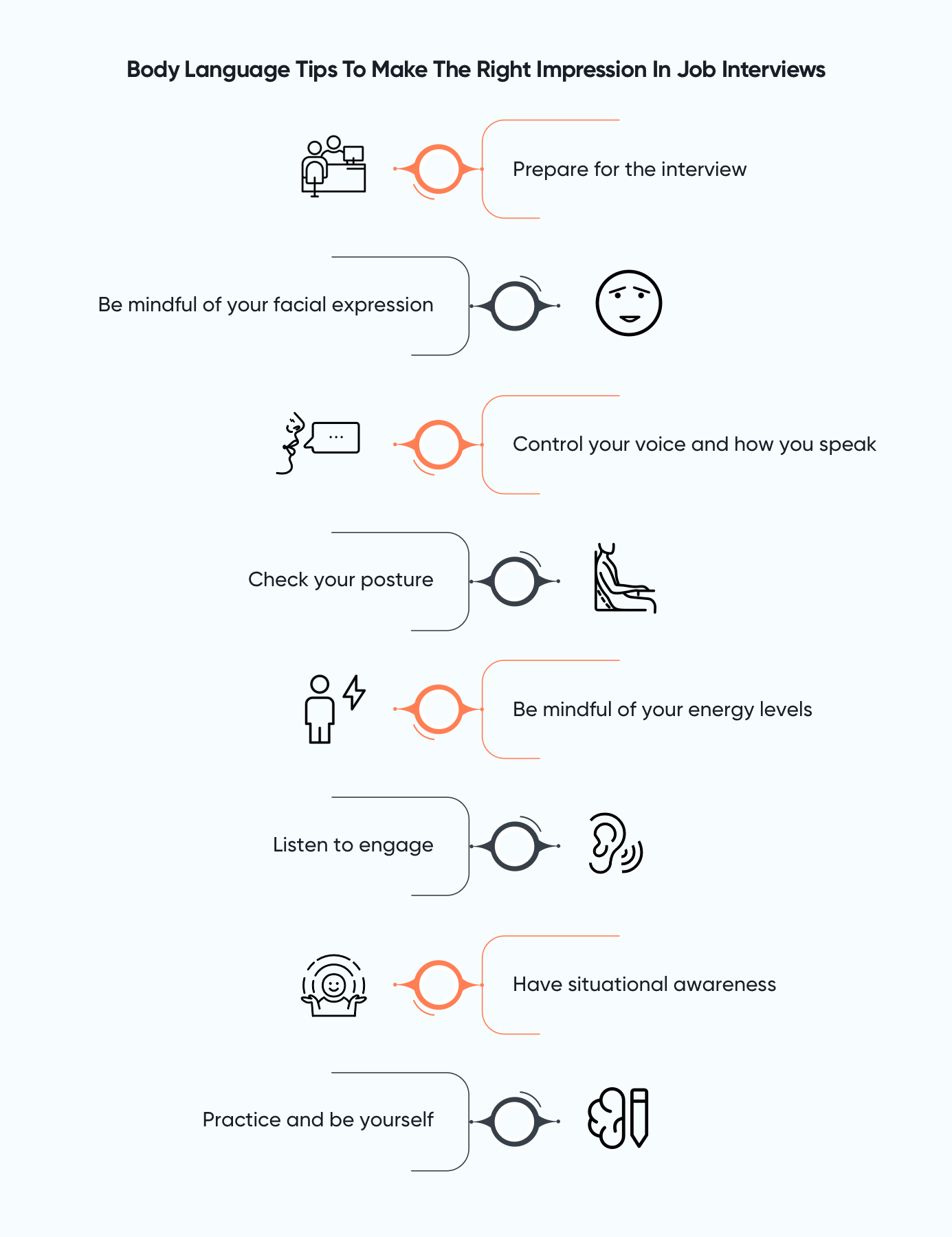
What Is Body Language?
Body language comprises nonverbal signals and cues used to represent oneself or communicate with others.
While verbal communication relies on words, body language conveys messages through facial expressions, body movements, and gestures.
It relates more to how we communicate than what we are communicating.
A person's body language plays a significant role in interpersonal interactions, influencing how others perceive them and interpret their messages.
Research published in the International Journal of Psychosocial Rehabilitation has found that 55% of how we impress others while speaking is based on our body language and only seven percent on our words.
So, understanding the psychological facts about body language can help you effectively navigate social situations, establish rapport, and convey emotions.
Why Is Your Body Language Important In Job Interviews?
We behave differently at home and in public. And a large part of that difference has to do with body language.
Most people have distinct body languages for when at home and work.
And for good reason.
In job interviews, body language shapes the interviewer's perception of the candidate's confidence, professionalism, and suitability for the role.
One study conducted by the MDPI in the healthcare industry found that when medical professionals had receptive body language, it increased workplace positivity and patients' course of treatment.
For instance, imagine if you were a techie or a manager in a client meeting.
Negative body language, such as slouching, avoiding eye contact, or speaking too low to be easily heard, would make the clients nervous about working with your team.
It would inevitably give off a signal of low confidence and lack of transparency.
Body Language Tips To Make The Right Impression In Job Interviews
Let these body language tips bring your attention to how you communicate with others non-verbally.
Awareness of your nonverbal cues and gaps can get you started in perfecting and using them to your benefit.
Like for a job interview—to make a favorable impression and increase your chances of interview success.
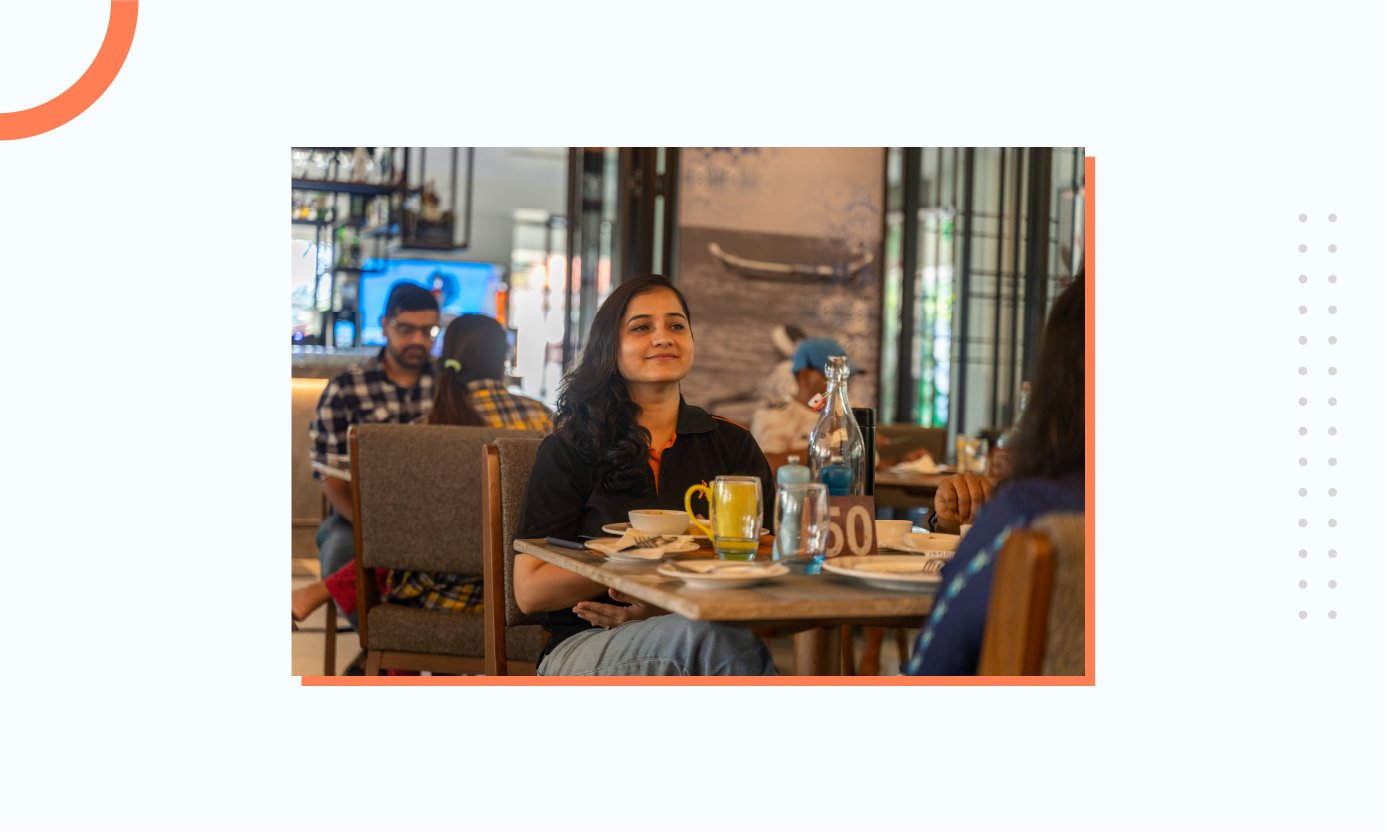
Prepare For The Interview
Though this does not actually fall under body language, it can significantly impact your overall success and how well you can follow the tips mentioned below.
When you go in unprepared, especially for a remote or video job interview, you have a high chance of appearing nervous and even incompetent.
A study published in the journal Technology, Mind, and Behavior notes that even factors such as camera distance, face size, and proxemics affect how we are perceived on video calls.
You can prepare for the interview by being mindful of these things:
- Research the company and the department
- Understand the job role and note down queries to ask in the interview
- Practice common interview questions; the more natural, the better
- Prepare questions to ask about the role, the company, your potential colleagues, work culture, success parameters, and whatever else you'd like to know
- Dress appropriately
- Set up your equipment properly if it's a remote interview
- Sit according to the direction of the light source so that you're properly visible
If you want to know how to best prepare for remote job interviews in more detail, click here.
And if you’re thinking of applying with us, these interview tips will come in handy.

Be Mindful Of Your Facial Expression
Understanding body language dos and don'ts, particularly nonverbal cues involving facial expressions, is critical for interview success.
Facial expressions affect the interviewer's perception of you and your suitability for the role.
The right facial expression conveys confidence, professionalism, and engagement.
- Eye contact establishes rapport and demonstrates attentiveness. Steady eye contact (don't forget to blink, though) creates a bond between you and the listener, which influences how invested the interviewer will be in your sharing
- And remember to smile (within reason and not if someone shares something unfortunate during the conversation). Smiling portrays warmth and approachability, key nonverbal signals
- Conversely, negative facial expressions like frowning or scowling can convey disinterest or discomfort
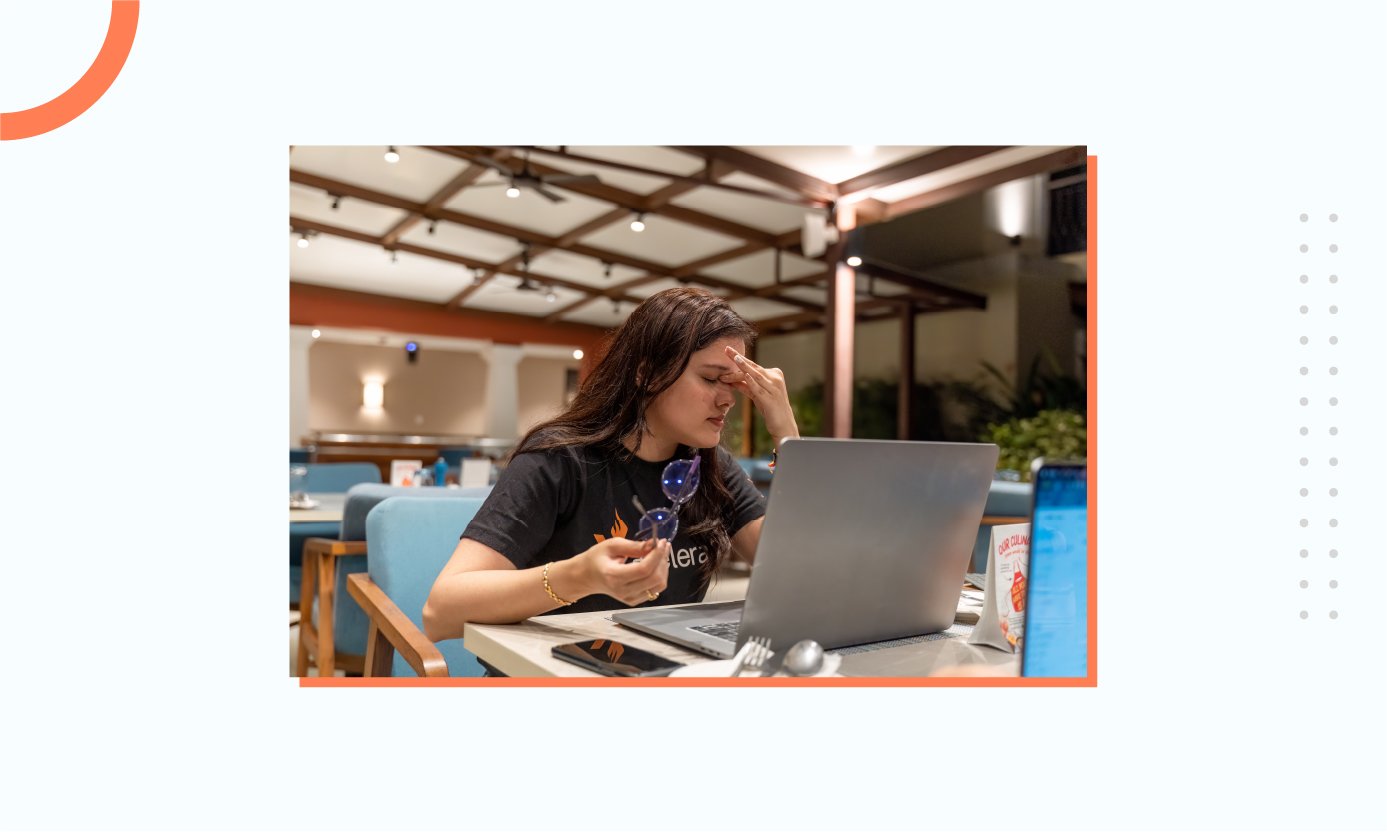
Control Your Voice And How You Speak
Have you ever met people who scream everything they utter as though the world around them has gone deaf?
Or those barely audible even when you are in the middle of nowhere?
Is it ever a smooth experience communicating with them?
Your voice decibel and speed of speech says a lot about your communication abilities and personality.
- Speed of speech: Speaking too quickly may make you appear nervous or anxious, and speaking too slowly can convey uncertainty or lack of enthusiasm.
It's crucial to find the ideal speaking tempo that aligns with the content being discussed and the overall tone of the interview. - Voice modulation and tone: Modulating your voice and using pauses to emphasize your message can create an impression of enthusiasm, confidence, and authority, boosting your professional image.
Conversely, speaking in a monotone or using an inappropriate tone can make you seem ineffective and weaken your communication. - Fillers and uptalk: Avoid filler words, such as "um," "like," or "you know" as much as possible.
Uptalk (a.k.a., upspeak or high rising terminal) is a speech pattern characterized by ending statements with a rising intonation, making them sound like questions.
This upward inflection at the end of a sentence can give the impression that the speaker seeks validation or confirmation, even when making declarative, confident statements.
Check Your Interview Posture
People often aren’t sure about how to sit in an interview to make a good impression.
The key here is focusing on your posture.
The right posture will make you look confident, calm, professional, and attentive to the interviewer.
Here are some points to remember:
- Avoid slouching or leaning back in your chair, as this can make you appear disinterested or unengaged. Instead, sit upright with your shoulders back, spine straight, and chin parallel to the floor
- Crossing your arms can create a barrier between you and the interviewer, so keep your arms relaxed at your sides or lightly resting on the table
- Excessive fidgeting or playing with objects can distract and convey nervousness. The same applies with feet tapping
- Using them sparingly and purposefully can enhance your communication and emphasize key points—if it comes naturally to you. Avoid wildly waving your arms or pounding the table for effect
- Gentle nodding when someone is explaining or speaking to you shows engagement
Be Mindful Of Your Energy Levels
One of the easiest giveaways of low energy levels is through one's nonverbal cues.
You may find yourself forcing a smile, struggling to concentrate, listen, and respond—your body language all slouchy and grouchy.
(I've interviewed people who joined in with terrifying frowns.)
It's safe to say that appearing for an interview with low energy levels is not ideal.
You may be interpreted as disinterested, unenthusiastic, or unenergetic.
To ensure interview success, consider these three things before the interview:
- Get adequate rest the night before to feel refreshed and alert
- Consider engaging in mood and energy-boosting activities, such as light exercise or listening to upbeat music, to radiate positive energy during the interview
- Practice positive self-talk and visualization techniques to mentally prepare for the interview and project confidence through your body language
- During the interview, engage actively with the interviewer and turn it into a two-way conversation where you show genuine interest in the role, team, and company
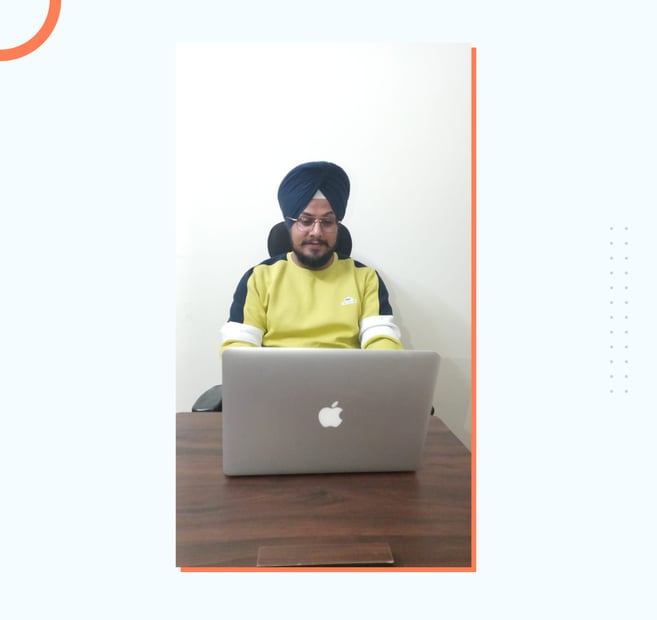
Listen To Engage
Active listening significantly impacts the quality of your interaction with the interviewer during any job interview.
Listening skills are crucial as they demonstrate your ability to understand and respond thoughtfully to questions and prompts.
You should aim for the 43:57 rule. Research suggests that when you listen more (57%) in conversations than speaking (43%), you create better relationships and rapport with people. You also increase chances of being liked, and, by extension, remembered—precisely the things you’d want in an interview.
Here are some tips to demonstrate active listening during an interview:
- Maintain eye contact and nod periodically to signal your attentiveness
- Avoid interrupting the interviewer and wait for them to finish speaking before responding
- Paraphrase or summarize key points (when applicable) to ensure understanding and show your engagement
- Ask relevant questions to clarify information or delve deeper into topics of discussion
- Provide verbal and nonverbal feedback, such as affirmative gestures or verbal cues, to show your interest and understanding
Bonus tip:
Here's a helpful perspective shift about interviews.
Candidates often feel pressured to respond immediately after a question without always taking the required time to gather their thoughts and formulate coherent answers that make sense or, even better, make a positive impact on the interviewer's mind.
Take that time. Realize that it is a conversation, not an inquisition.
Have Situational Awareness
Your mind frame and demeanor may not always match the interviewer or the interview atmosphere.
That's why it's necessary to have a sense of situational awareness.
Situational awareness in a job interview refers to understanding the context, tone, and level of formality of the event.
When you learn to read the room, you can adapt your body language to improve interview performance.
Here's how you can increase your situational awareness for job interviews:
- Observing the interviewer's demeanor and communication style
- Noticing the organization's culture and environment
- Paying attention to verbal and nonverbal cues from the interviewer
- Adapting your language and tone to match the level of formality
- Being aware of any cues about the interview progress or next steps (for example, if the interviewer seems uninterested or is yawning involuntarily, it's a bad sign, and you need to bring life back into the conversation)
- Adjusting your behavior based on the interview setting and dynamics and by following body language dos and don'ts
Adapting to the situation ensures that your responses align with the interview context and expectations.
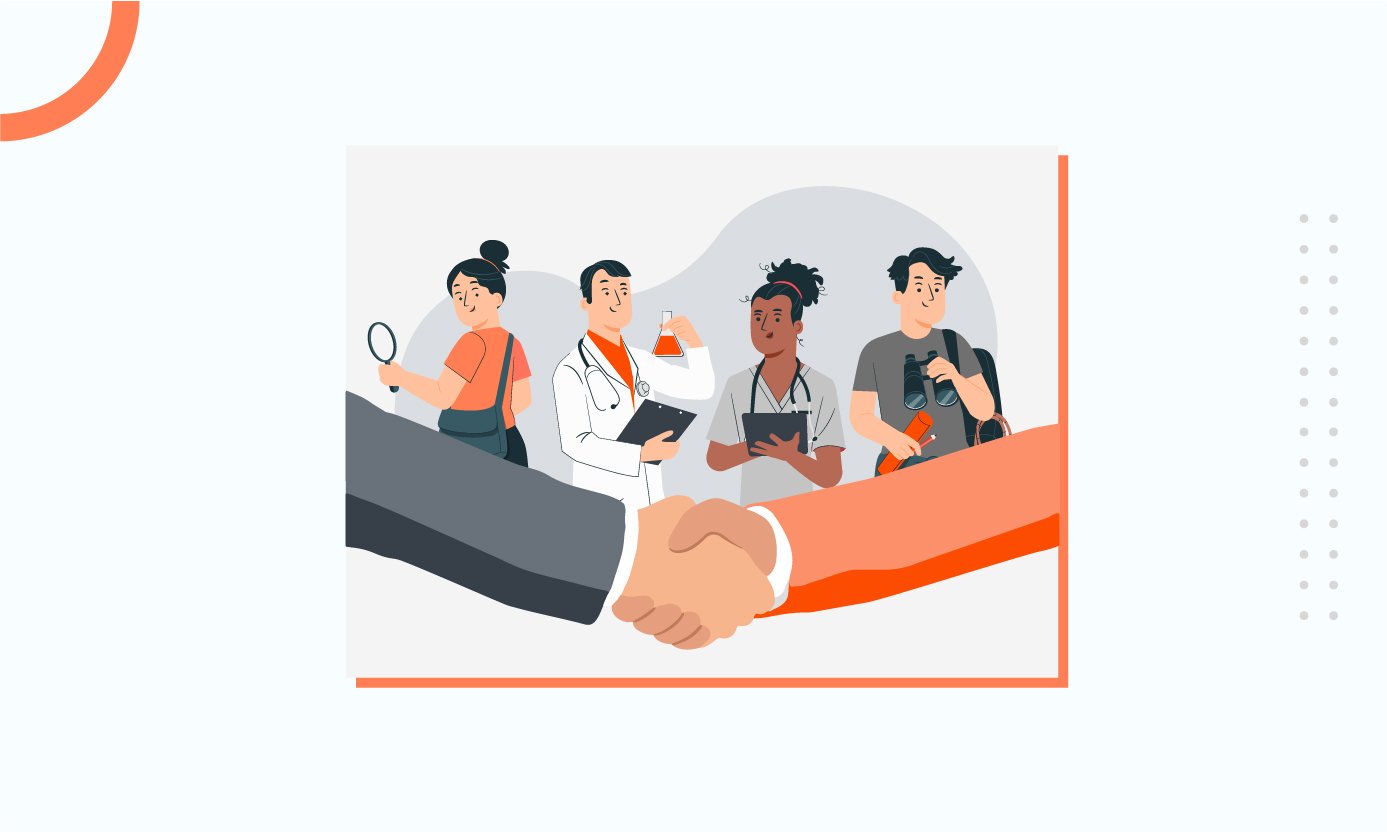
Practice And Be Yourself
A soft skills professor in my college would intentionally sit for job interviews in various companies. That was his way of practicing and sharpening his interview skills.
Practicing interviews, especially when looking for a change, is an excellent way to get good at presenting yourself authentically and confidently.
Simulate real interview scenarios with a trusted friend, mentor, or career coach. Practice answering common questions and receive feedback on your demeanor and responses.

I will level with you here: following these tips doesn't guarantee you will crack the interview.
Because body language is just a part of the whole interview process.
Sometimes, you’ll have your confidence dented coming out of an interview. And it may not always be your fault.
Some organizations willingly see if you can stay calm under undue pressure. Perhaps because that's their work culture norm.
And they want people who fit in with them.
So, don’t get disheartened if you don’t crack the first couple of interviews.
You’ll get the one meant for you in your journey of growth and prosperity.

Rohit Ganguly, Content Marketer
Rohit is a content marketer first and a YouTuber second. He loves to interact with animals, feed them, clean his apartment, and spend time with friends and family. Curious by nature, he also enjoys literature, movies, meditation, and calligraphy.

 We respect your privacy. Your information is safe.
We respect your privacy. Your information is safe.
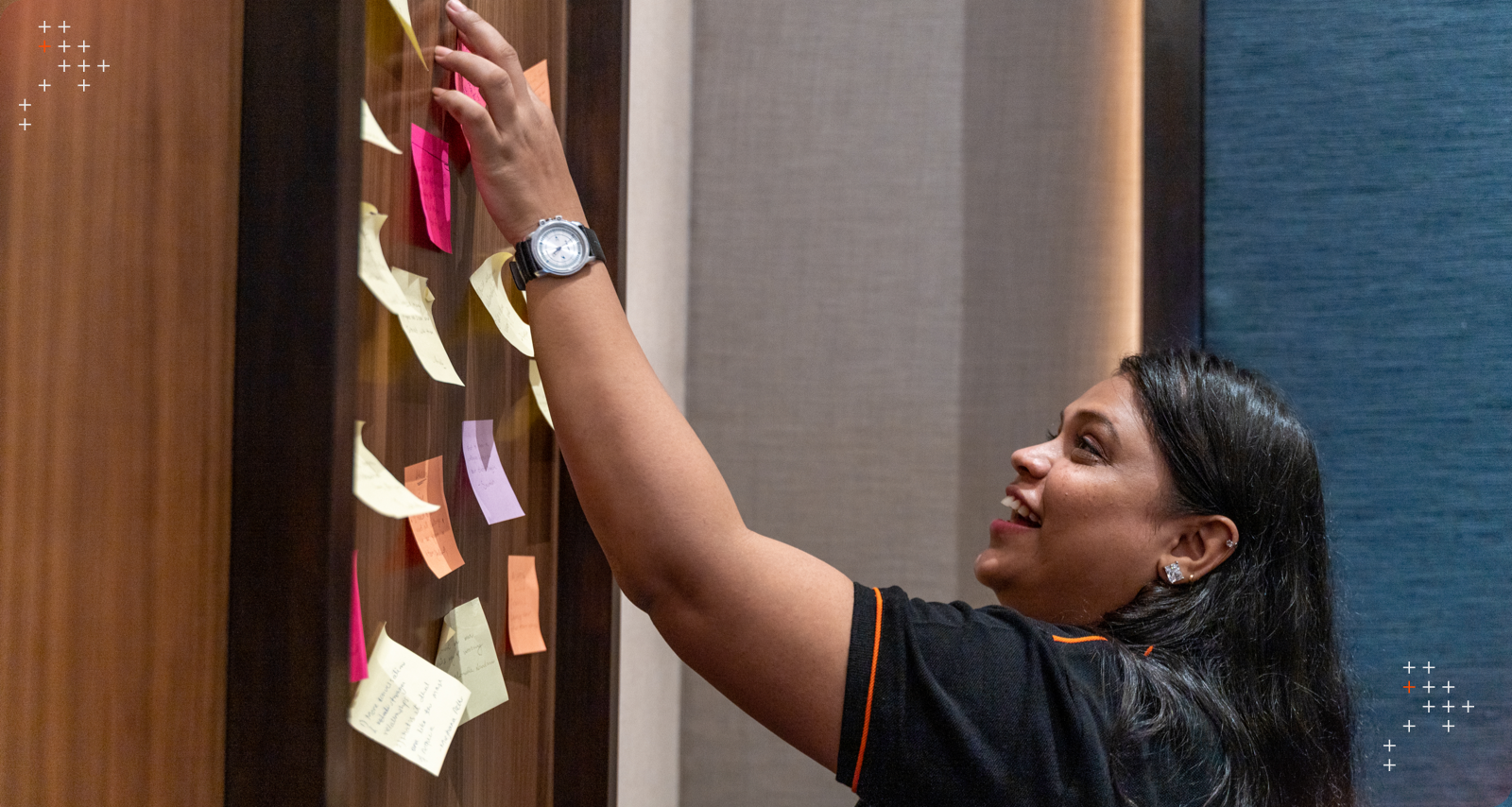
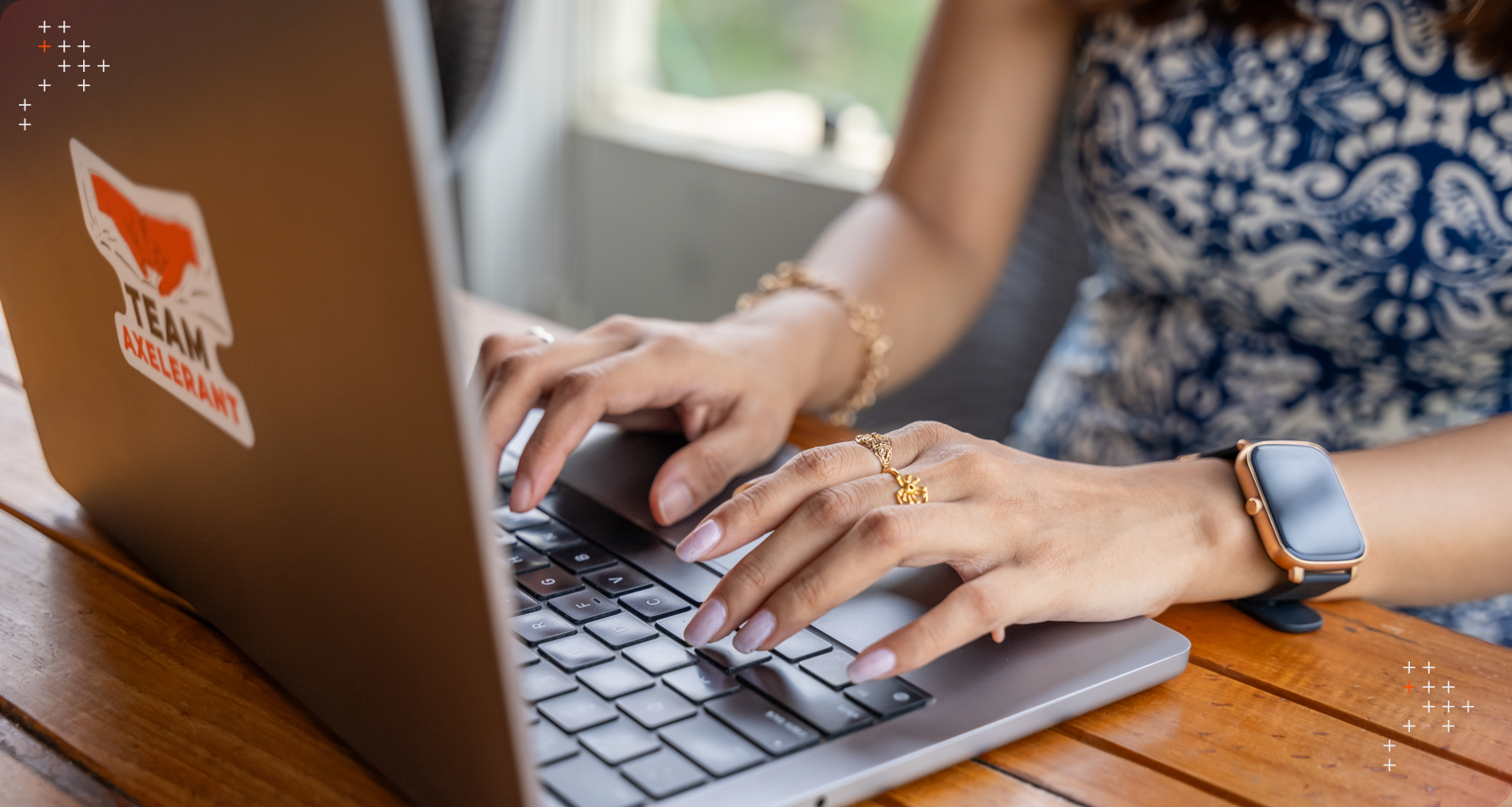

Leave us a comment